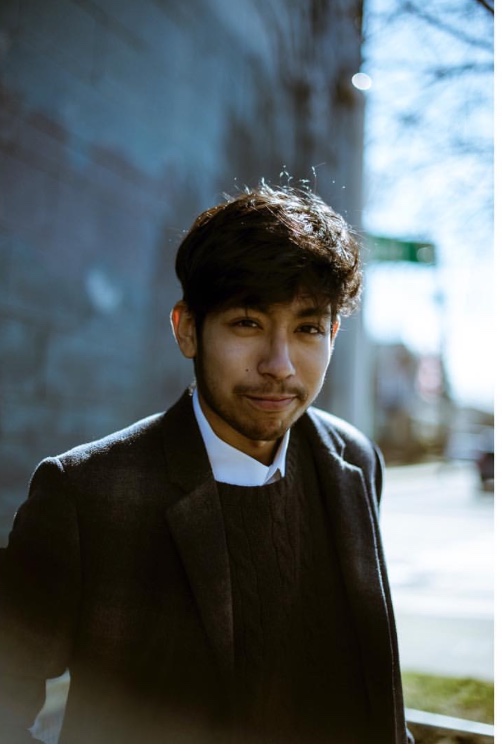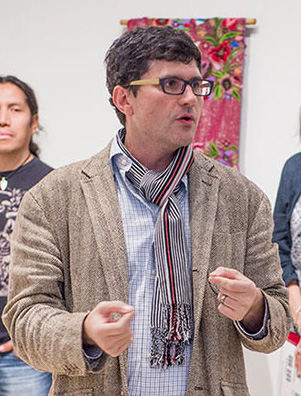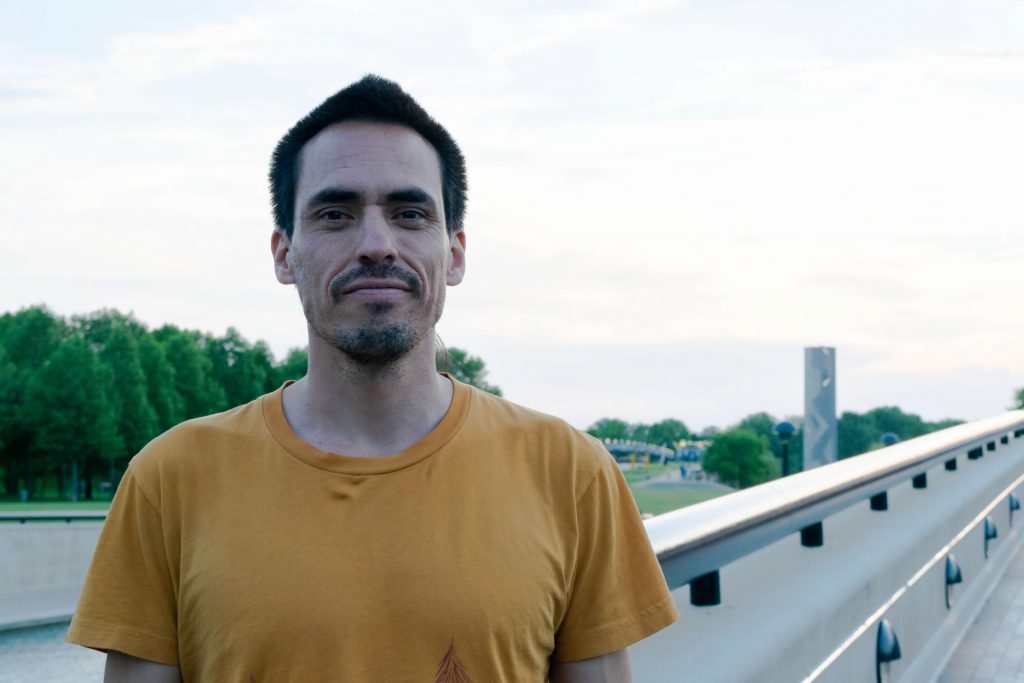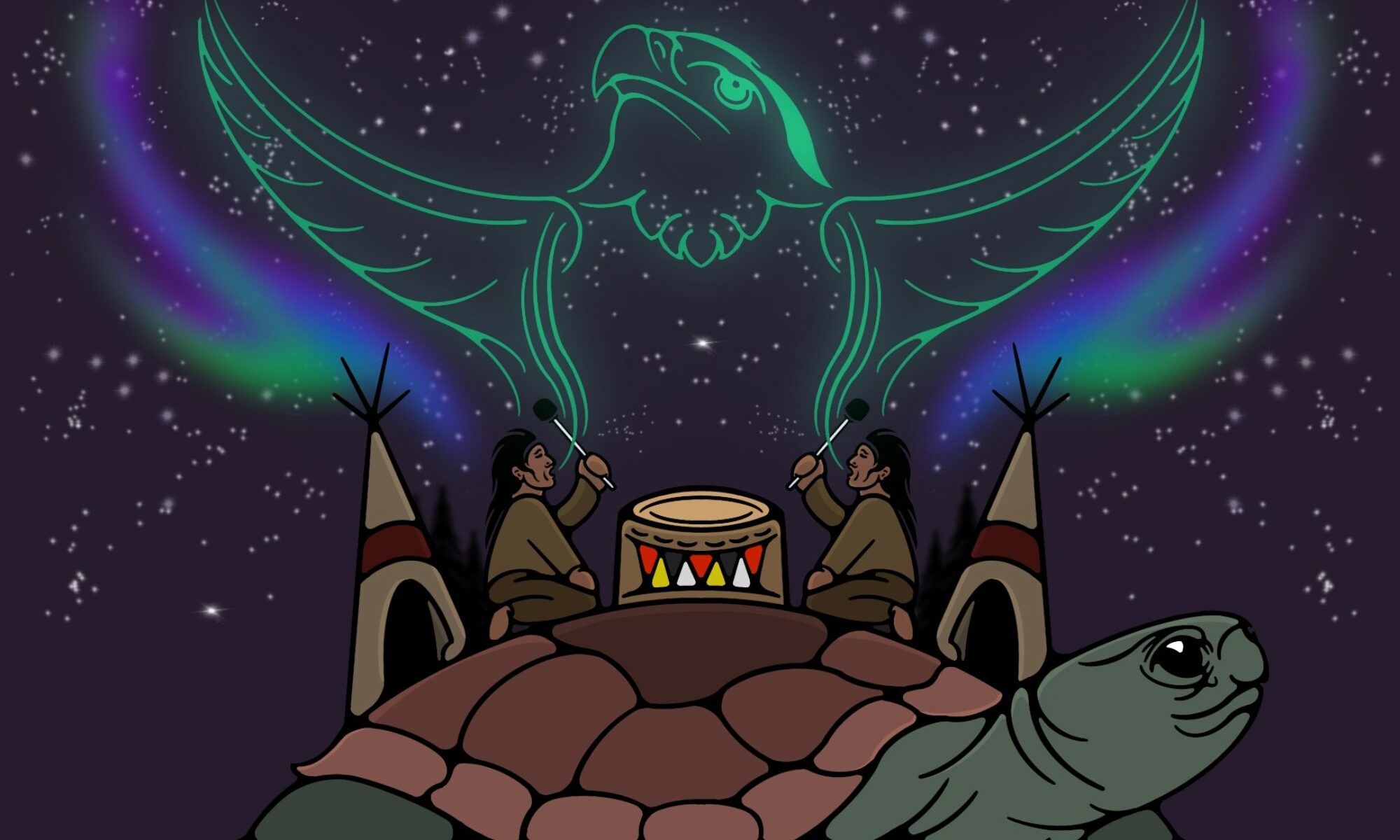In bridging pop-culture with land issues and spirituality, indigenous youth have embraced genres such as rap, punk, jazz, graffiti, and heavy metal since the early 1990’s. In the case of hip-hop it shouldn’t surprise us that an aesthetic that was born at the crossroads between Black American, Caribbean and Latinx migrants at a time when the South Bronx, NY was burning, would be adopted by native artists who, as protectors of their lands, have been reminding indigenous and non-indigenous peoples alike that tradition and language must be constantly moving.
Rhythmic lyrics, drums, stomp-dances, pow-wows have been beating for millenia among First Nations from Abiayala (The Americas.) Together with the rich phonetics of glottal and tonal indigenous languages, they have sparked contemporary indigenous hip-hop. Furthermore, acknowledging non-alphabetic writings such as rock-paintings, petroglyphs, geoglyphs, ideograms and textiles, contemporary indigenous graffiti artists are occupying and reclaiming cities, materials and technologies. Today, in activating indigenous beats, languages and codes via hip-hop aesthetics, our guest-artists this month in Siwar Mayu are challenging stereotypes and expectations about indigeneity while empowering women, elders, children and keepers of the land (Juan G. Sánchez Martínez.)
Luanko Minuto Soler (Mapuche)
Gonzalo Luanko is an artist of the new Cumbia & Rap Mapuche. As a teenager he started under the pseudonym “Soler Minute,” which he later evolved toward his “Mapuche identity”, adopting his first name as his artistic name. Luanko is a teacher of History and a composer with five albums already released. He has traveled throughout the Chilean territory and has taken his “kimün” (Mapuche wisdom) to other countries such as Uruguay, Argentina and the United States.
His discography, Inche Ta Luanko (2011), A Pies Pelados (2012), Oral Tradition (2015) and Ketrolelán (2017), contains verses that alternate between Spanish and Mapudungún, reactivating the native language and delivering a message to the new generations for the reconstruction of the Mapuche culture. His lyrics reflect upon the history of the struggle and worldview of his people. Instruments such as the trompe, pifilka, trutruka or kultrún appear frequently in his songs. His latest album called Ketrolelán / I am not silent includes the participation of Movimiento Original, Santa Feria and Spokesman. It was nominated for the Pulsar Awards 2018, in the Native Peoples category, and contains the song “Witrapaiñ / We are Standing” with Portavoz, whose videoclip was made in the Wallmapu / Tierra Mapuche. Luanko’s music evolution has taken him from hiphop to Latin American rhythms and today he is working with DJ Seltzer in a new album of Cumbia-Rap Mapuche.
Liftun / Limpieza © Luanko Minuto Soler Liftun ~ Purification © Translation by Paul M. Worley
Verse 1
Newentu amuleiñ / Let’s walk strong
Cheu pvle miauken / where we’ve always walked
Welu tañi mongen mu / but my life
kiñeke meu norlay / sometimes is not well
Zunguyen mu alkvlay / speaking bad, not listening
Mvlele wezake zungu / if there are bad things
Tañi piuke konlay / my heart does not want that
Kvmeche kvme zungukelu / good people who speak well
Lif piuke lif pulli ngelu / people with clean hearts and spirits
Poyentu nvtram nielu / have sweet conversations
Tañi pulli konki / where my spirit always goesÑi mongen mu liftun zuamki / my life needs to be clean
Liftun mvlele feita rume fali / if it needs to be cleaned, that’s worth it
Norche ngelan / I’m not always correct
Welu kvmeche ngen / but I’m a good person
Rume trani tañi mongen / my life goes down
Welu newenkvlen / but I’m still strong
Inche kimche ngelan / I am not wise
Welu chilkatuken / but I’m always learning
Kelluken ñi pu Che / I always help my people
Fei mu kvzaukvlen / which is why I work
Kvpape feyentun tañi kultruntun / for the belief to come and the kultrun to be played
Kvpape poyewvn tañi ngvlamtun / for the benefits of my advice to come
Lefvlkantun ñi piuke mu / my heart’s fast song
Kom tufachi zungu / all of these Tañi liftun / are how I clean things
Chorus
Kvtrankawvn mvlele / if there is suffering
Kiñe liftun / a cleaning
Afi zungu mvlele / if something ends
Kiñe liftun / a cleaning
Weza zungu mvlele / if there are bad things going on
Kiñe liftun / a cleaning
we newen nieam / to have renewed strength
Verse ll
Inche zuamlan tami koila ngvlam / I don’t need your false wisdom
Inche zuamlan tami vtrir nvtram / I don’t need jealous conversations
Fei ta kvmelay kvmelay kvmelay / that’s not right, not right, not right
Welu lif newen nieiñ aflayai / but we have clean internal strength
Kiñeke lelin neyen ayekan / some looks, breathing, happiness
Kuifike winkul kiñeke trekan / ancient mountains, some strolls
Kiñe llellipun mawvn lelfvn kurruf / a ceremony, rain, the countryside, the wind
Lifko kuifii kvtral / clean water ancient fire
Kom tufachi zungu niey lawen liftual / all of these have the medicine to clean
Kimi tami rakizuam llitual / your thoughts know to begin
Kiñe matetun purrun Datun / a mate, dance, healing
Kiñe yafutun lefkantun / a strengthening, running
Kiñe nampulkan niey liftun / a trip can cleanAkutuy kvme weftun / the rebirth is here
Inkakeiñ taiñ kewvn mongeli / we will defend out living language
Taiñ püllü mu weichatuki / our spirit fights
Taiñ Tukulpan akupe / let our memory come back
Cheu pvle traupaiñ wezache konkilpe / let bad people not enter where we get together
Taiñ trawvn kvme amupe / let our coming together be good
Taiñ liftun afkilpe / let the cleaning not end
Chorus ………
Verse III
Kvpape feyentun tañi kultruntun / for the belief to come and the kultrun to be played
Kvpape poyewvn tañi ngvlamtun / for the benefits of my advice to come
Lefvlkantun ñi piuke mu / my heart’s fast song
Kom tufachi zungu / all of these
Tañi liftun / are how I clean things
Chorus …….
~~~
Zara Monrroy (Comca’ac)
Roxana Sarahí Romero Monrroy was born in Hermosillo, Sonora in 1991. She is originally from the Comca ́ac nation in Sonora, México. She is a composer, poet, translator and writer. She is also an activist and fighter for human rights and gender equity. Zara is committed to preserving and transmitting the lyrical tradition Cmiique Iitom, through song and ritual representation of her ancient knowledge. She combines her own language and way of expressing the message of her ancestors with western genres. As a traditional Pascola dancer, Zara recreates the ancient art of facial painting, redefining it and adding to it new symbolic elements. She practices the ancient art of singing and composing in her mother tongue, Spanish, and English.
Regardless, she believes that a well intentioned message doesn’t need translation- it only needs to touch the heart of those that hear it. Currently she is the founder and an active member of the ecology club AZOJ CANOJ that operates within the Comca ́ac territory, and is composed of young women from the Punta Chueca community in Sonora. She coordinates different events and procedures, such as setting up recycling workshops and waste management.
Tcoo quipee aha / Vibración positiva © Zara Monrroy ~ Tcoo quipee aha / Positive Vibration © Translated by Ivan Melchor
He ziix quii quipee quih tcooma xiica quiistox ihmaa quih iquii oyequetx, he ziix quii cöimpla quih hanso ihyomactim isoj,tax ziix quih quipe zó ihmáa aha.
/ I thank my enemies, I thank all those that criticize, because it always comes back around, we should always send positive vibrations to people.
Me ziix quisax ihmaa quih ihmpoho x, consacaixaaj aha, yooz quih maquiho ha tax, ziix quiipe tcooma tax aha taax, ziix quipee quih taax insactiim aha, hant quipee quih taax insoha, hant ifi xah ihamoc xah, taax ihpoot taax sacaha, ox pahihos, ox spacta aha.
/ You, human that walks and breathes, why don’t you do the same, be thankful with everything and everyone, send good vibrations to the animals, to the people, with nature, that is calmness and happiness, harmonious with what you desire and ask for and everything will unfold.
Zaah zó tocpop taax isxeen coompácah x, insiyaha, insihoha, ox spacta caha, zó intimooz? Taax quipee aha, me ziix quisaax ihmaaá quih impoho ihaax insayaha, taax sacaha.
One day you’ll know everything is temporary, but it is truly worth it, be thankful. Aren’t you a human that feels? Life is human, emotions and feelings, but this is real.
Xepe iteel intica impaho ziix ccam hequee quih taax ihmpoho x, hant quiij consacaixaaj aha, hammime com maziim, xepe coil com maziim, tcoo quipee aha.
/ When you walk to the edge of the sea, be yourself, surrender with your heart in order to be and experience life as it is, everything is beautiful, the sea is beautiful, the sky is beautiful, the earth is beautiful, send positive vibrations and connect.
Taax sacaha taax ziix quipee caha insocta aha.
Hant quiij consacaixaaj aha.
/ that’s how this is, everything is good when we know we are in the right place, be yourself and thank the earth where you step .
(spoken at the end)
~~~
Tall Paul (Anishinaabe / Oneida)
Tall Paul is an Anishinaabe and Oneida Hip-Hop artist enrolled on the Leech Lake reservation in Minnesota. Born and raised in Minneapolis, his music strongly reflects his inner-city upbringing. From personal expressions of self, to thought provoking commentary on issues affecting Indigenous and diverse communities as a whole, Tall Paul’s music evokes a wide variety of substance and soul.
Prayers in a song © Tall Paul
Verse I
I feel the latent effects of assimilation
Inner city Native raised by bright lights, sky scrapers
Born with dim prospects, little peace in living
As a child, hot headed bout the fact I wasn’t wild
Like they called my ancestors, imagined what it’d be
To live nomadic off the land and free
Instead I was full of heat like a furnace cause I wasn’t furnished
With language and traditional ways of my peeps
Yeah I used to feel like I wasn’t truly indigenous
Now I say miigwech gichi-manidoo
For showing me my true roots, definitely Native
Take responsibility for being educated
My people and customs originating from early phases
Of history it’s, deeper than frybread
And contest pow-wows, tears shed in the sweat lodge
Prayers go out to all those I’ve wronged
And who have wronged me gotta treat em like family
Hook
Gichi-manido wiidookawishin ji-mashkawiziyaan / Great Spirit help me to be strong
Mii dash bami’idiziyaan / So that I can help myself
Miizhishinaam zaagi’iiwewin / Show us all love
Ganoozh ishinaam, bizindaw ishinaam / Talk to us, hear us
Mii-wenji nagamoyaan / That is why I am singing
Nimishomis wiidookawishinaam ji-aabajitooyaang anishinaabe izhitwaawin / Grand father help us to use the Anishinaabe customs
Mii-ji-bi-gikendamaan keyaa anishinaabe bimaadiziwin / So that we’ll know how to live the Anishinaabe way/the good life
Verse II
Becoming aware of a heart beats fragility
So I pray for my creator’s will and humility
It seems my prayer’s weak I can’t speak, not a linguist
Does he hear my English when I vent I fear the answer
To the question, this is symbolic of anguish
I feel regarding language and the obligation of revitalizing
Something sacred, failure to carry through is disgracing
A Nation, my first tongue’s in need of a face lift but
Deciphering conjugation’s like trying to find
My way through a maze in the matrix, complex
Hard to start without an end aside from being fluent
I gotta push the limit if I’m gonna keep pursuing
So I use it in a way that relates to my life and vocab
Bring some entertainment to it, spit it on a track
And I take it out the class, can’t let what I lack
Become a self-defeating habit that’ll make me want to quit
Hook
Verse III
It’s far fetched but Grandfather please help me learn it
Help me assist in keeping it from burning
Don’t let me quit and flee from working for a worthy purpose
Enlighten me and help me comprehend effects of my service
I need a spark in my desire from something higher
Prior to negative reminders killing my stride
Sometimes I’m the type that likes getting results
Overnight, without sweating or stressing overnight
So I pray
Creator give me strength, so I can move on
Creator show us love, so it can spread around
Communicate with us, from above, hear me now
My prayers in a song I speak em out loud
Grandfather help us to revitalize the language
And ways so we walk the Red Road
That you paved, communicate with us from above
Hear me now, my prayers in a song I speak em out loud
~~~
More about Native Hip-Hop
“The anticolonial beats of Indigenous Hip Hop”
About the translators/collaborators

Ivan Melchor was born in Charlotte, North Carolina in 1997. Presently he studies history at the University of North Carolina Asheville. He has published his undergraduate thesis regarding the migration of Latinamericans to the western region of North Carolina. In 2019 he assisted in a project with the UNCA Department of Languages and Literature to translate a collection of interviews of immigrants from Asheville, N.C. USA.

Paul M. Worley is Associate Professor of Global Literature at Western Carolina University. He is the author of Telling and Being Told: Storytelling and Cultural Control in Contemporary Yucatec Maya Literatures (2013; oral performances recorded as part of this book project are available at tsikbalichmaya.org), and with Rita M Palacios is co-author of the forthcoming Unwriting Maya Literature: Ts’íib as Recorded Knowledge (2019). He is a Fulbright Scholar, and 2018 winner of the Sturgis Leavitt Award from the Southeastern Council on Latin American Studies. In addition to his academic work, he has translated selected works by Indigenous authors such as Hubert Malina, Adriana López, and Ruperta Bautista, serves as editor-at-large for México for the journal of world literature in English translation, Asymptote, and as poetry editor for the North Dakota Quarterly.

Juan G. Sánchez Martínez, grew up in Bakatá, Colombian Andes. He dedicates both his creative and scholarly writing to indigenous cultural expressions from Abiayala (the Americas.) His book of poetry, Altamar, was awarded in 2016 with the National Prize Universidad de Antioquia, Colombia. He collaborates and translates for Siwar Mayu, A River of Hummingbirds. Recent works: Muyurina y el presente profundo (Pakarina/Hawansuyo, 2019); and Cinema, Literature and Art Against Extractivism in Latin America. Dialogo 22.1 (DePaul University, 2019.)
